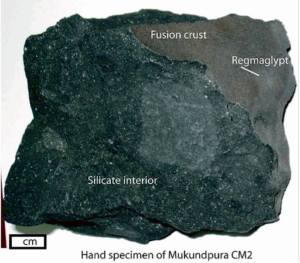In News: Mukundpura is a new CM chondrite fell near Jaipur, Rajasthan, India on June 6, 2017 at 5:15 IST.
About Mukundpura CM2

- An asteroid which made its landfall in Mukundpura village near Jaipur has been named after the same village and is under the study of Geological Survey of India, Kolkata.
- The meteorite named Mukundpura CM2 was classified to be a carbonaceous chondrite.
- This is a type of stony meteorite, considered the most primitive meteorite and a remnant of the first solid bodies to accrete in the solar system.
- The composition of carbonaceous chondrites is also similar to the Sun.
- Chondrites are silicate-droplet-bearing meteorites, and this Mukundpura chondrite is the fifth carbonaceous meteorite known to fall in India.
What study said ?
- Mukundpura CM2 had experienced varying degrees of alteration during the impact.
- Minerals like forsterite and FeO olivine, calcium aluminium rich inclusion (CAI) minerals escaped alteration.
- Few magnetites, sulphides and calcites were also found.
- Further X-ray studies showed it also had aluminium complexes.
- Detailed spectroscopic studies revealed that the meteorite had very high (about 90%) phyllosilicate minerals comprising both magnesium and iron.
















